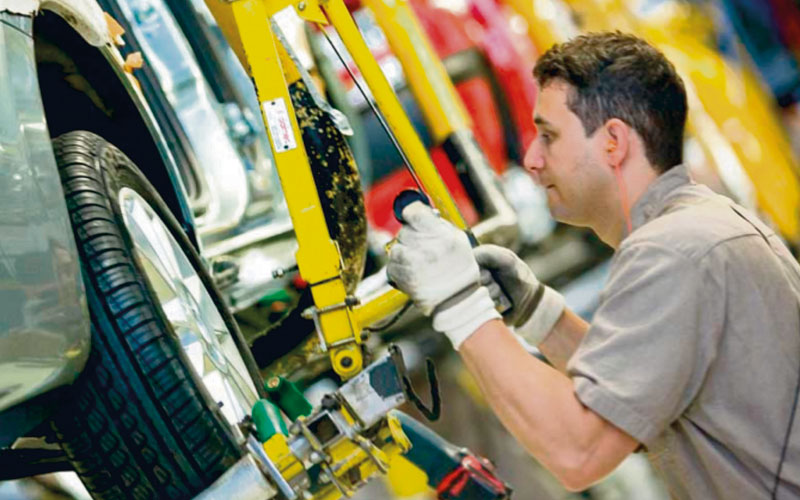Mexico has become one of the most dynamic hubs of the global automotive production industry, now generating £18.6 billion in revenue.

Mexico’s automotive industry is progressing at full throttle and just recently overtook Brazil to become the world’s number seven, before Spain and France. Considered by analysts as one of the most dynamic hubs of the global auto industry, Mexico produced 2.4 million vehicles in the first nine months of 2014, a 7.5 per cent increase over the same period last year, while exports rose 8.7 per cent to reach 1.95 million units, according to the Mexican Auto Industry Association (Asociación Mexicana de la Industria Automotriz, AMIA).
“This reflects a tendency that we have been seeing this year,” says Fausto Cuevas, General Director of AMIA, adding that the total output for this year is expected to reach 3.2 million vehicles. “The panorama is favourable in the international markets.”
In a move that illustrates the importance of this sector for Mexico’s economy, President Enrique Peña Nieto himself announced in August a new major foreign investment: South Korean automaker Kia will build a £621 million plant outside Monterrey. Mr Peña Nieto said that the automotive industry, including parts makers, now represents 20 per cent of Mexico’s manufacturing production and 26 per cent of its exports. It also generates £18.6 billion in revenue, representing 6 per cent of foreign direct investment (FDI), and more than 550,000 direct and indirect jobs, according to AMIA.
Moreover, in the past five years, the sector has attracted £11.8 billion in new investment from foreign carmakers, including Nissan, Honda, Volkswagen and Mazda, and production has doubled. Now a magnet for international carmakers and their suppliers, Mexico is poised to reach a production of 4 million units (cars and light goods vehicles) a year by 2020.
Several reasons explain this boom, the first one being obviously the proximity of Mexico to its main market, the US. The general good quality of transport infrastructure (highways and railways), a strong steel industry, and a young (the average age in the automotive industry is 24) and comparatively cheap (about £25 per day) workforce also contribute to the success of the sector.
But there is another key factor, as noted by Mr Peña Nieto, and it is the fact that Mexico has free trade agreements with 44 nations. The United States, in contrast, has free trade accords with only 20 countries, and none with either the European Union or Japan. “We have a unique geographical location with privileged access not only to North and Latin American markets but also to those of Europe and Asia,” he said.
About 66 per cent of Mexico’s auto exports currently go to the US market, 8 per cent to Canada, 11-12 per cent to Latin America, 8.3 per cent to Europe and the remainder to Asia and the Middle East.
Now what is particularly interesting as well is that Mexico has earned a reputation for the high quality of its automotive industry. “The quality and cost of Mexican automotive products have no equal in Latin America,” says Luis Lozano Soto, automotive team leader at the Mexican branch of consulting firm PricewaterhouseCoopers.
This is one of the main reasons why foreign carmakers are now producing highly sophisticated vehicles here, rather than in Europe or in the US. For example, the German firm Audi decided recently to move the production of luxury SUVs from home to Mexico.
Audi will thus produce the Q5, one of its star vehicles, in Mexico, and is introducing new technologies and production methods for the next generation of vehicles. Audi says it will buy 90 per cent of the parts necessary for the Q5 in North America, and has conducted a thorough review of its entire supply network in Mexico, in particular to detect any quality flaws along the supply chain. Also, Audi is providing training to small suppliers to make sure quality has the same, very high standards throughout the supply chain.
This in turn provides new business for companies that are specialised in training workforce and management in quality certification, such as Plexus International, which has a branch in Mexico. Created in 1991 in the US, Plexus is “a global leader in providing training, assessment and consulting services for organisations to attain quality management systems excellence”. It operates in several industrial sectors: aerospace, automotive, environmental management, healthcare, higher education, and laboratory management.
Having started the business by helping “thousands” of Asian industries to implement the ISO9000 certification, Plexus was then approached by leading American carmakers Chrysler, Ford and General Motors. Today, they are present in Latin America (Mexico, Brazil), Europe (France, Italy, Spain), Asia (China, Japan, South Korea, Taipei, India), Russia, and South Africa.
In the automotive sector, Plexus cooperates with leading organisations such as the Automotive Industry Action Group (AIAG), the International Automotive Oversight Bureau (IAOB), and the American Society for Quality (ASQ). “Our global presence has led to big projects with AIAG and the International Aerospace Quality Group (IAQG). We are small but have great business partners,” says José Domínguez, Director General of Plexus International Mexico.
Asked about the specificities of the Mexican market in terms of human resources and training, he says that “one of the advantages in the Mexican market is its bilingual training”. “In key sectors focused on exports, such as the automotive, aeronautics or medical devices, professionals must be bilingual. It is one of Mexico’s professional features,” adds Mr Domínguez.
In Mexico, Plexus International offers technical development in areas such as management systems and methodologies, including training and development for auditors. “Since 2012, AIAG has established a collaboration agreement with Pro Mexico, in order to give professionals in the supply chain of the automotive industry (second level down), training programmes and qualification schemes with partial sponsorship. This project has been successful and we have great expectations for the coming years.”
0 COMMENTS